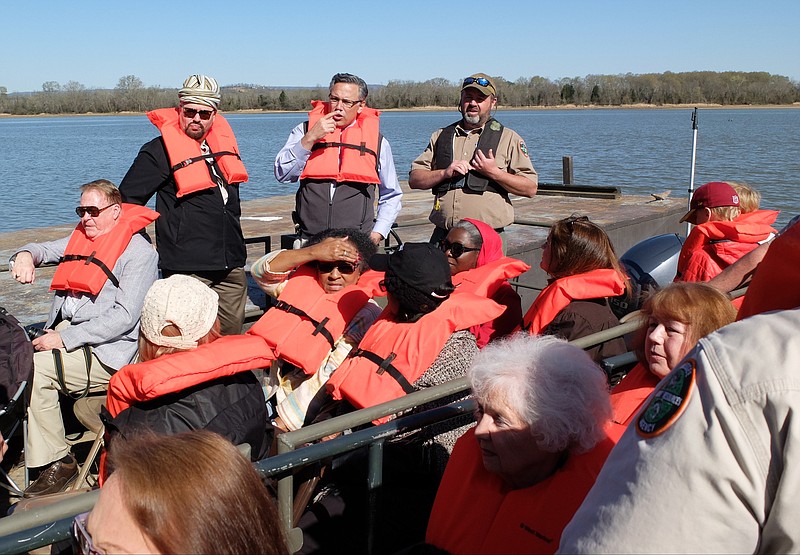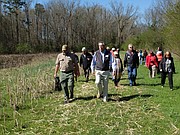Photo Gallery
The hidden history of Hiwassee IslandGroup visits Meigs County site of former Cherokee village where Sam Houston lived
More information
Click here for more information on the Cherokee Removal Memorial Park and Hiwassee Island.
HIWASSEE ISLAND, Tenn. - Gliding through the smooth waters around the northern tip of Hiwassee Island, Denton Florian said he had long wanted to make this trip, out to the little green spot at the confluence of the Tennessee and Hiwassee rivers where so much history comes together.
"I've wanted to come out here to this island for a number of years," said Florian, executive producer of the documentary "Sam Houston." "Places like this give me chills. I could sit out here for a week and just think."
Florian was one of roughly 30 guests to the island last week, among a group that came from parts of Texas and the Cherokee Nation in Tahlequa, Okla.
Hiwassee Island was once the site of a flourishing Cherokee village, and home to John Jolly, eventual principal chief of the western tribe. For a time, Hiwassee Island was also the home of Sam Houston, eventual governor of Tennessee and founding father of Texas, and is where he met his eventual wife, Diana, Jolly's niece.
The Hiwassee Island tour group stopped in Meigs County last week while trekking up to Maryville, Tenn., where a monument to Sam Houston was unveiled over the weekend.
The visit came as local historians and contributors are trying to reconnect this area's historically significant dots, which sometimes get lost in rural areas like Rhea and Meigs counties because of a lack of public funding and awareness.
Greg Vital, president and CEO of Morning Pointe Assisted Living and a contributor to local preservation projects, helped build the Cherokee Removal Memorial Park in Meigs County - which was done on less than $1 million, he said - and helped orchestrate the recent visit by Texas and Cherokee Nation dignitaries.
"There's an important Native American story that goes back 2,500, 3,000 years or more," Vital said last week. "Twenty years ago or so-plus, we decided the story wasn't being told. It's interwoven, but it was never connected."
Vital said he is working to help put the wheels in motion to raise awareness about the rich history of the rural region around Chattanooga, and perhaps eventually to gain recognition from state and federal government of local, historically significant sites like Hiwassee Island.
Vital owns property around the Cherokee Removal Memorial Park. He said there is Civil War history in the area, as well as other Native American artifacts and sites. He said he is excited over discoveries made recently in the area and on Hiwassee Island.
Shawn Patch, a geophysicist recently contracted by TVA to run ground-penetrating radar on Hiwassee Island, told the Texas and Cherokee Nation tour group last week the goal of gaining federal recognition and designation for places like Hiwassee Island may not be too far-fetched.
Patch recently completed the most comprehensive study of Hiwassee Island since the 1930s, when scientists and researchers with the Works Progress Administration scoured the island and performed extensive studies and digs. The advent of World War II brought an end to the research.
The WPA digs turned up a rich history on the island, but the studies fell by the wayside after TVA bought and flooded thousands of properties in the Tennessee Valley. Still, the legend of Hiwassee Island as a history-rich site remains vivid today.
"The fact that I got to work out there was a real privilege," said Patch. "It's the highlight of my career."
He said Hiwassee Island is "probably the most complicated site from [the Mississippian] time period."
Patch said ground- penetrating radar discovered a series of palisade structures and numerous burnt structures, likely homes. He said the island is rich with artifacts, and that its inhabitants likely pre-date the Cherokee by 700 years or more.
Many historically significant sites like Hiwassee Island along the Tennessee River now are submerged, he said.
"This is one of the few that's actually remaining, that people can go and study, that people can go and visit," said Patch. "It really should be listed on the National Register (of Historic Places) for a lot of different reasons."
The visitors' group - including a Supreme Court justice of the Cherokee Nation and the great-great-granddaughter of Sam Houston - walked Hiwassee Island themselves. They saw a small Cherokee burial mound as well as the likely site of a former larger mound that destroyed by the WPA digs in the '30s, and the likely former site of John Jolly's home.
The tour primarily covered the island's northern tip where the Cherokee village stood, which Patch jokingly referred to as "downtown Hiwassee."
Today, Hiwassee Island is owned by TVA and is under the care of the Tennessee Wildlife Resources Agency. The state has in the past leased part of the island to farmers and also maintains a wildlife area for sandhill cranes.
By and large, however, the island has remained undisturbed since the 1930s, with most of the remains of the old village safely several feet below the ground.
Florian said the undisturbed, natural site was part of the draw to him.
"Coming to a site like this is one of the most exciting things to me, because it hasn't been all gussied up," he said. "You're seeing what (Houston) saw. You're walking the ground he walked."
Vital believes others interested in the area's history also would come here to visit in person. He imagines a future where rural areas like Rhea and Meigs counties capture the double benefit of preserving nationally historic sites while developing local, conservation- based tourism.
"We bring all the stories together here on the Tennessee River," he said.
Contact staff writer Alex Green at agreen@timesfreepress.com or 423-757-6480.

